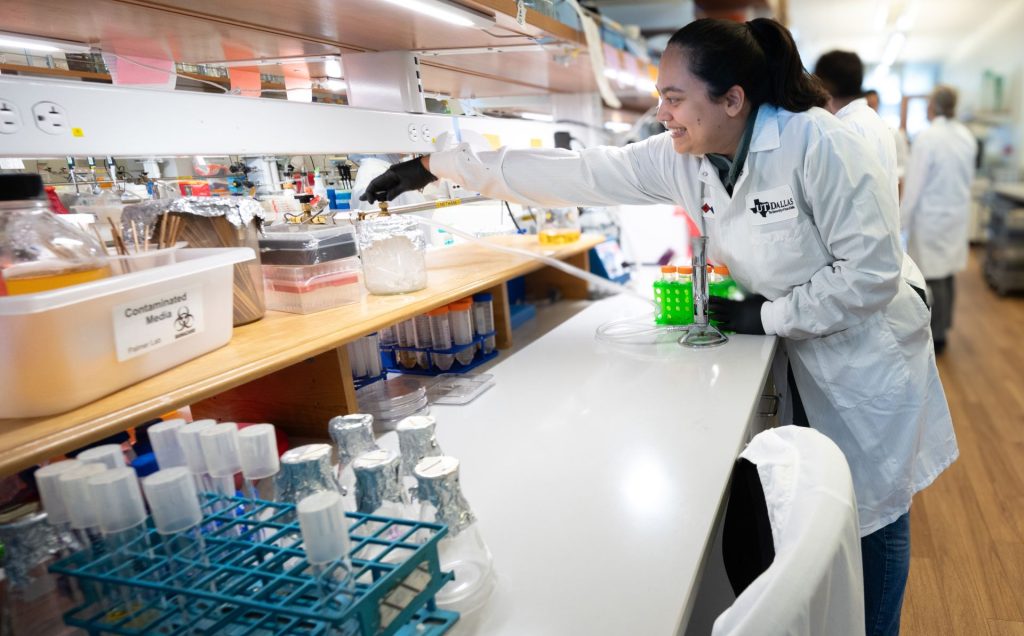
Last of a four-part series
By Rick Vacek | March 7, 2024
Clay Gabel wants to become a radiologist. Thanks to the Tiny Earth Initiative, he’s getting a head start on studying medical images in a most unusual way.
Logan Kain wants to go into law enforcement. Thanks to the Short-term Working Groups (SWGs, pronounced swigs), his head start resulted in a relationship-building, resumé-solidifying experience.
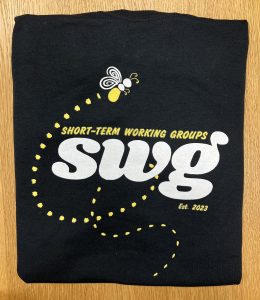
They aren’t the only University of Texas at Dallas students benefiting from these opportunities. There are many more.
It is a classic example of higher education’s ability to provide a preview of a promising future … if only students, even freshmen, will just raise their hands to the possibilities of the present.
Gabel is collaborating with the University of Michigan medical school to identify bacteria resistant to a commonly used antibiotic. He never would have gotten this opportunity if he hadn’t discovered the Tiny Earth Initiative in his microbiology lab course.
“One of the major problems in health care is infectious disease. Being able to study bacteria that are responsible for the infectious diseases that we see in clinics every single day has been a really great opportunity to understand the complexity of what the hospital looks like,” he said. “It makes biology into an applicable puzzle rather than just memorizing information.”
How Tiny Earth works in the general microbiology class of Dr. Kelli Palmer, professor and department head of biological sciences and Cecil H. and Ida Green Chair in Systems Biology Science: Pairs of students collect soil samples, isolate the bacteria and screen the bacteria for their production of antibiotic molecules. One student even discovered a new species.
Gabel’s Tiny Earth experience was so good, he was delighted after graduation to become a Palmer lab employee. The Michigan project was Palmer’s idea – she’d always wanted to team up with a friend there, and Gabel was more than happy to step in.
“It’s been really cool to learn about antibiotics and different characteristics of bacteria, how their cell structures are different, how they work internally with their local proteins,” Gabel said. “It’s also really interesting to then learn genetics because of it, because taking it out of the class and moving it into Dr. Palmer’s lab has been more about extracting their genomes, looking at what it is and specifically how it’s different from other bacteria like it.
“One of the most important things that I have been able to see from the Tiny Earth program is that we have been able to isolate a lot of understudied bacteria. We’re getting to do some really fun and innovative bioinformatics about them to understand their genomes.”
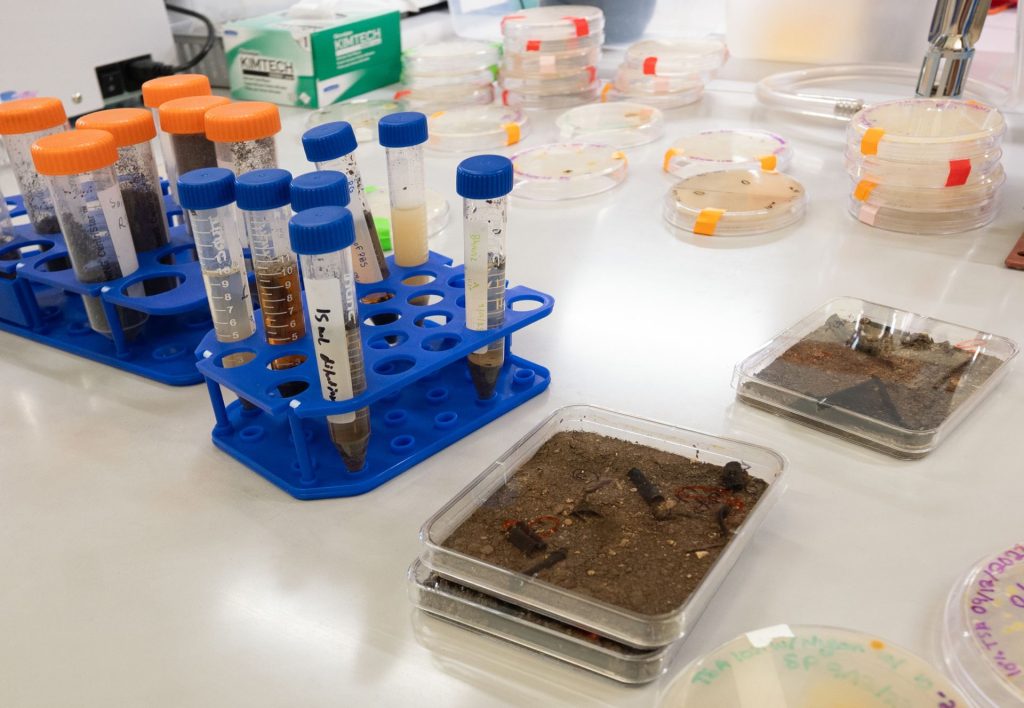
Gabel’s fascination with science goes way back. Even as a small child, he said, he told people he wanted to be a veterinarian and later declared he would earn a doctorate in ornithology.
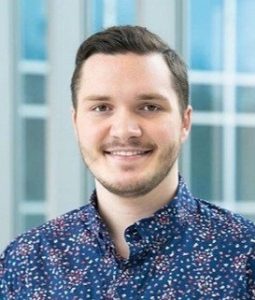
“You’re 6. How do you know the word ornithology?” people would ask him.
In high school, he watched hours of videos about evolution and chemistry. “I’ve just always been a science-y person,” he said.
Nevertheless, he applied as a music major to various colleges – he plays the bassoon and flute – until friends started urging him to think about UT Dallas. One of them told him he’d make a great doctor.
“Maybe medicine would be good for me,” he thought to himself, and added UTD to the list – as a health studies major. He was accepted and later added biology to his focused studies.
“I’ve never looked back,” he said. “It’s been an amazing ride.”
Hopping onboard the Tiny Earth program has been one of the best parts of his journey, and Palmer wants to keep making it even better for all students by expanding the scope of the class from identifying organisms to finding out the spatial distribution of the molecules they’re producing. To accomplish the latter, she hopes to acquire an imaging mass spectrometer.
“I think there’s a lot of room for growth and a lot of room to take this foundation that we’ve built and give even more students broader ranges of skills and experiences,” she said. “Right now, it’s a microbiology class. But what if it became microbiology and chemistry? We’d be introducing them to more marketable skills.”
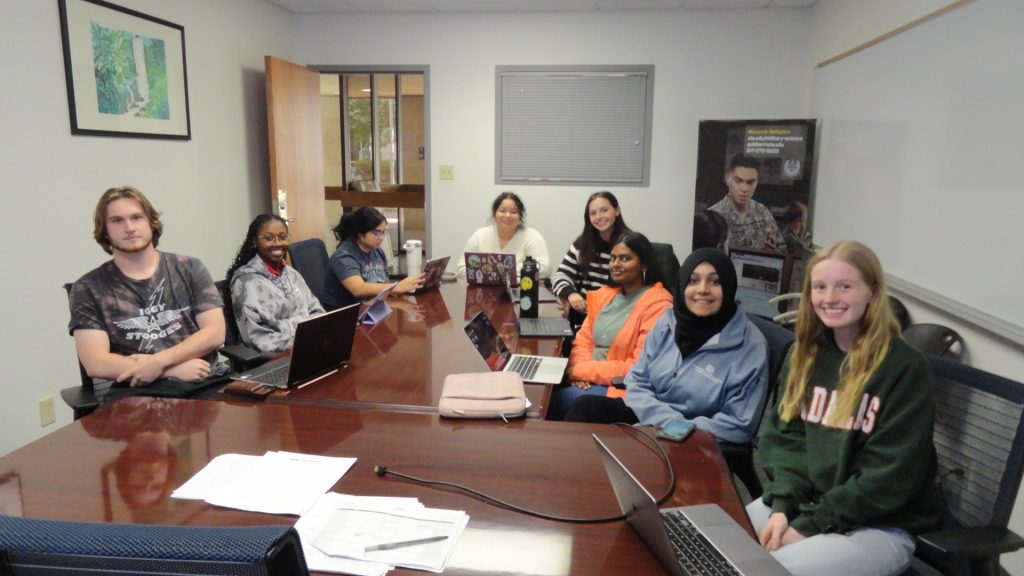
Dr. Arthur Vasquez MS’16 was focused on the right now when he formed a SWG. The assistant professor of instruction in the Criminology and Criminal Justice Program once had a long list of contacts within local agencies, but then the pandemic struck.
He wanted to lengthen the list, and he didn’t have time for such a monumental task. Then he heard that students wanted more connections with those same agencies. It was a marriage made in SWG heaven.
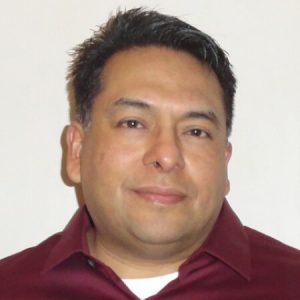
“When I saw the Short-term Working Group, I thought, ‘Well, let me attend this session to see if this is a possibility to help me organize it,’” he said. “Once I got the lowdown on what the group is about, I put together a research team. That way, they can learn as I go.”
The instruction was painstakingly thorough.
He accepted every student who was interested and had them all fill out a questionnaire to find out their interests, then assigned them agencies that fit their choices.
He established work groups.
He showed them how to write a professional email.
Then he let them seek out internships, volunteer opportunities, guest speakers and potential research projects. He even showed them how to respond appropriately when the email received a positive reply.
The result was stunning: His list of 40 agencies grew to almost 180.
“I anticipated, ‘OK, they would get some basic information and … done,’” he said. “But the agencies loved it. These agencies were just flooding back because, post-COVID, they lost a lot of contacts, we lost a lot of contacts.
“It was nice to hear executive directors say to the students, ‘We want to thank you for your email. We’ve always wanted to get involved, but we didn’t know how.’ And the same thing on our side: ‘We wanted to get involved, but we didn’t know how to ask. We had to learn how to ask.’”
The involvement went beyond emails. The students attended meetings at the agencies and learned how to comport themselves in those settings, complete with how to dress. They met people who could be their future supervisors and co-workers. Most importantly, they got opportunities they never would have experienced.
Faith Fraser, a criminology junior, was asked where her SWG, which included a meeting with a probation agency, ranks among her UT Dallas learning adventures. “It’s definitely one of the first professional experiences I’ve been able to have, so it’s pretty high up there,” she said.
And it transformed into this: She’s doing an internship in the Plano Police Department’s Victim Service Unit.
Sophomore Adaeze Ogoazi was thinking about applying to the UT Dallas Police Department after her meeting with officials there. “I had never been in the UTD Police Department,” she said. “I didn’t even know where the office was.”
“It’s definitely one of the first professional experiences I’ve been able to have, so it’s pretty high up there.”
FAITH FRASER, UT DALLAS SOPHOMORE, ON WHERE HER SWG EXPERIENCE RANKS IN HER ACADEMIC CAREER AT UT DALLAS
Senior Lluvia Dematta felt intimidated when she started reaching out to organizations, but then she observed how smoothly Vasquez connected in a meeting with members of a City of Dallas committee. “I’m not intimidated anymore,” she said.
Kain, a criminology junior whose interest in law enforcement has been inspired by his father’s work in that field, jumped at the opportunity to help Vasquez organize and conduct a career fair with law enforcement agencies. “I’ve always talked to cops anyway, but it was nice to do it in a more official manner,” he said.
Getting to know Vasquez better was another SWG benefit for the students – and for him as well.
“They had an idea of what professors are, and next thing you know we’re just talking. Their walls came down. They were more open,” he said. “They learned a lot. I learned a lot.”
Ogoazi even learned, to her surprise, that Vasquez enjoys hip-hop music, just like her. “She said, ‘You listen to that?’ I was like, ‘What did you think I listen to?’” he said, grinning.
But when you examine all the benefits of Tiny Earth and the SWGs and any other extracurricular or out-of-the-educational-box opportunity, it comes down to this: College is about more than just going to classes and labs and studying. There is so much else that’s available, right from the start.
“I think that’s the thing about UTD – it is what you make of it,” Kain said. “If you let yourself just get out there and do something, I guarantee you’ll be better for it.
“We had a lot of freshmen who were reluctant to do things, but you could see it by the end of the sessions – they just seemed a lot happier.”
****
Previous stories in this series:
Part 1: Short-term Groups Transform Research Perspectives
Part 2: SWGs Give Students a Taste of Becoming Known
Part 3: SWGs Build Enthusiasm for Space Bricks, ‘Gertie’
****
UT Dallas faculty can learn more about SWGs in an information session scheduled for 9 to 10 a.m. Thursday, April 11, in MC 2.404. Register